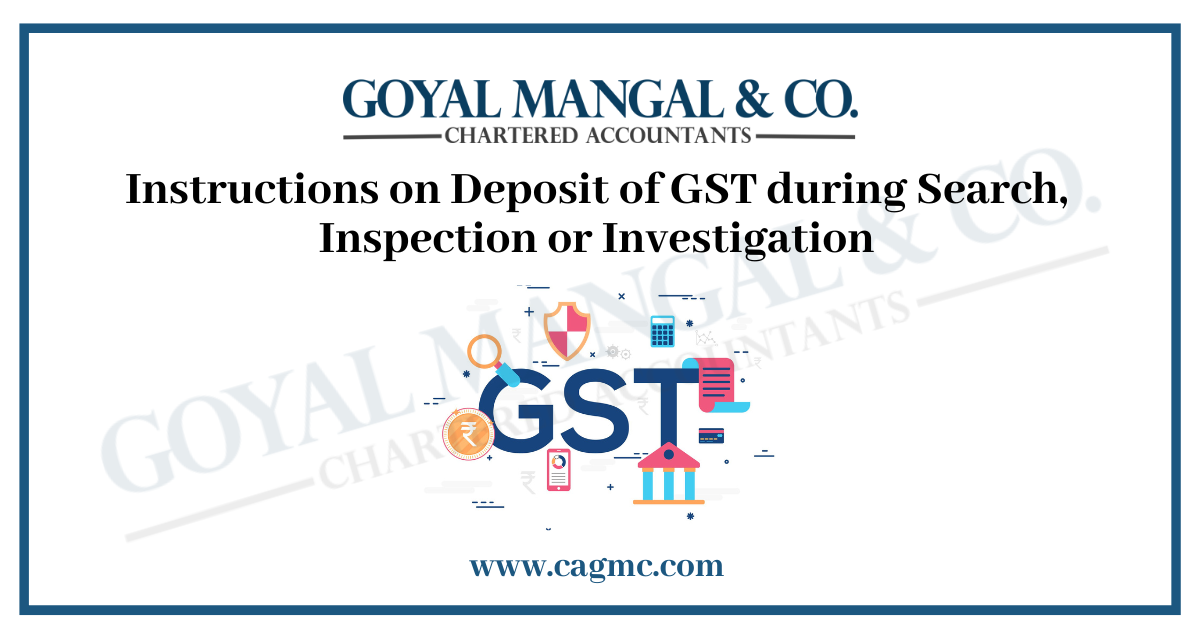
GST Investigation Wing issued Instruction No. 01/2022-23[GST-INV] dated 25 May 2022 on deposit of tax during the inspection, inspection, or investigation. This was issued in light of complaints and allegations of coercion by GST officials during the search for tax refunds.
Short Glimpse
In the GST regime, the inspection, investigation against the taxpayer, or inspection of the establishments of the taxpayer can be carried out by the officers of the department. A proper official can conduct an investigation into the taxpayer’s business activities. They may ask for documents for further investigation, like master agreements with buyers and sellers, tax invoices issued by buyers, audit reports for a particular year, etc. Sometimes there is a tendency to overreach and the proper officer may resort to coercion somehow to make the assesses pay taxes under threat or coercion. There have been cases where the assesses have approached the High Courts for redressal in this regard.
Inspection and Search under GST
Inspection’ is a new provision under the CGST/SGST Act. This is a more lenient provision than a search, allowing officers access to any place of business of a taxable person, as well as any place of business of a person who transports goods or who owns or operates a warehouse or warehouse. According to the legal dictionary and as stated in various judicial pronouncements, the term “search” in plain language refers to the action of the government apparatus to go through, inspect or carefully examine a place, area, person, object, etc. to find something hidden or for the purpose of finding evidence of a criminal act. The search of persons or vehicles or premises etc. can only be conducted under the proper and valid authority of law.
Who can order search under GST and when?
An officer of the rank of Joint Commissioner or above may authorize an officer in writing to carry out a search and seizure of goods, documents, books, or effects. Such permission can be granted only if the Joint Commissioner has reason to believe that any goods subject to seizure or any documents, books, or things relevant to any proceedings are concealed in any place.
The issue faced by taxpayers during Search/Inspection/Investigation
Taxpayers who are the subject of search, inspection, or investigation proceedings due to late or incorrect tax payments may voluntarily surrender part of their liability. However, there have been cases where these taxpayers have complained about the use of force or coercion by the GST officials. This was aimed at taxpayers to “reclaim” taxes by asking them to voluntarily pay these charges. The taxpayers approached the High Courts in this matter.
Who can order for carrying out “Inspection” and under what Circumstances?
According to Section 67 of the CGST/SGST Act, an inspection can be carried out by a CGST/SGST officer only on the basis of a written authorization issued by an officer of the rank of Joint Commissioner or above. A Joint Commissioner or an officer of higher rank may grant such permission only if he has reason to believe that the person concerned has done any of the following:
- Suppressed any supply transaction;
- The suppressed stock of goods on hand;
- Claimed overpayment of input tax;
- Has violated any provision of the CGST/SGST Act for tax avoidance;
- The transporter or warehouse owner stored the goods that evaded payment of tax or kept his accounts or goods in a way that could cause tax evasion.
Option for voluntary deposit of tax in Form DRC-03
Under the CGST Act, 2017(hereinafter, referred as Act) taxpayers have the option to pay taxes by voluntarily submitting Form DRC-03. This allows taxpayers to pay taxes by voluntarily increasing their liability or responding to any show-cause notice. The use of DRC-03 helps taxpayers meet their obligations and reduce the burden of interest due to late payment of taxes or higher penalties imposed.
The law does not prevent any taxpayer from voluntarily paying taxes. Since this option involves taxpayers making payments voluntarily, only the taxpayer himself who logs into the GST portal using his login and password can initiate this option. This means that taxpayers cannot be forced to make payments through this mechanism during search queries. However, officials should inform taxpayers about making voluntary payments through DRC-03.
How will the GST Department be able to reclaim taxes from Taxpayers?
In its guidance, the GST Investigation Wing emphasized the process for recovering taxes. Taxes can be recovered under Section 79 only after:
- Taxation is determined by the appropriate official.
- The taxpayer is served with a show-cause notice.
- The issue of the order confirms the demand.
- If the dues are not paid within three months of the order date, the purchase will be canceled.
The GST Department can only initiate recovery actions after following the processes outlined in the Act. In any scenario when the essential laws are not fulfilled, it is impossible to collect taxes from the taxpayer. As a result, the issue of tax collection cannot emerge outside of the foregoing procedures in any other circumstance, even during officer search and investigation operations.
Instruction on deposit of GST during Search, Inspection, or Investigation
The following are the instruction in relation to the deposit of GST during Search, Inspection, or Investigation
- As per the CGST Act, 2017, the taxpayer has the option to deposit the tax voluntarily by submitting DRC-03 on the GST portal. Voluntary payment of tax prior to issuance of show cause notice is permissible under the provisions of Section 73(5) and Section 74(5) of the CGST Act, 2017.
- Refunds of unpaid or underpaid taxes can be made under the provisions of Section 79 of the CGST Act, 2017 only after the due legal process of issuance of notice and subsequent confirmation of application by issuance of the court order.
- No recovery shall be made unless the amount becomes due under an order passed by the Adjudicating Authority or becomes due otherwise under the provisions of the CGST Act and the rules made thereunder.
- No bar to taxpayers for voluntarily making payments on finding their liability for non-payment/short payment of taxes before or at any stage of such proceedings.
- The tax official should inform taxpayers about the voluntary tax payment provisions through DRC-03.
- Chief Commissioners / Chief Commissioners, CGST Zones and Pr. The Director General DGGI is advised that in case any complaint is received from a taxpayer regarding the use of force or coercion by any of their officials to recover the amount deposited during inspection or inspection or investigation, such complaint may be requested as soon as possible and in case of any misconduct on the part of any revenue officer, strict disciplinary action may be taken against the defaulting officers as per law.
The remedy offered to taxpayers whose taxes were Forcibly Retrieved
The directive also includes remedies for taxpayers who have been subjected to such pressure by GST officials in order to recover taxes during search and inquiry. Any taxpayer complaints about the use of compulsion to recover taxes will be investigated as soon as possible. Any wrongdoing by the police would result in stern disciplinary action by the department.
This GST department guidance reinforces the fact that the department can only collect taxes by following the processes outlined in the Act and not by any other methods. Form DRC-03 is a purely voluntary option offered to taxpayers and cannot be utilized to recoup taxes.
Conclusion
Although this is a welcome clarification, the only consistent implementation of this measure is expected to help provide relief to taxpayers from harassment/terrorism during searches and investigations. This instruction of the GST department enforces that the department can collect taxes only after following the procedures of the law and not by other means. Form DRC-03 is a voluntary option for taxpayers and cannot be used as a tax collection tool.


